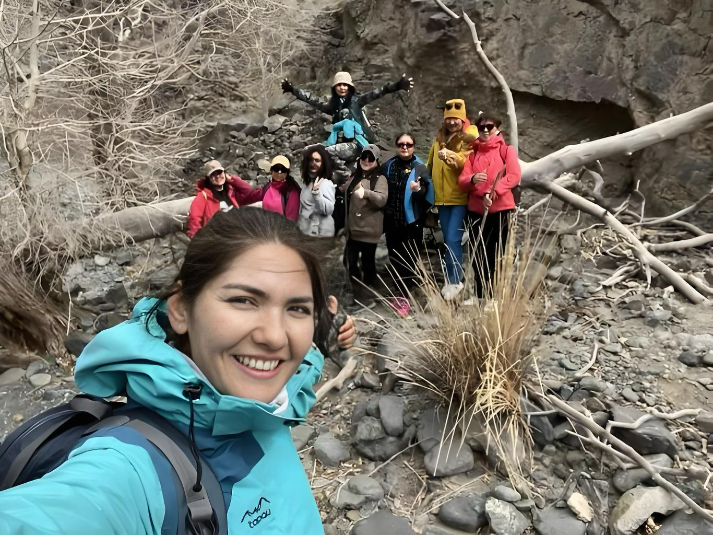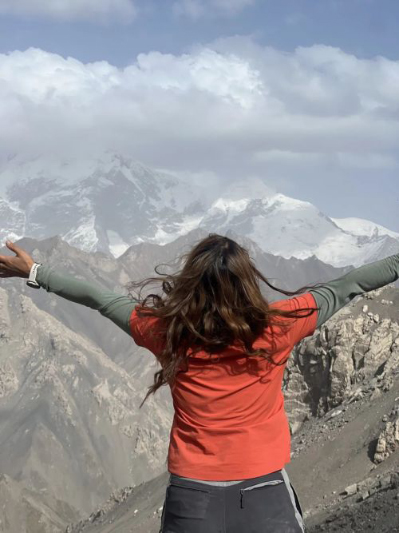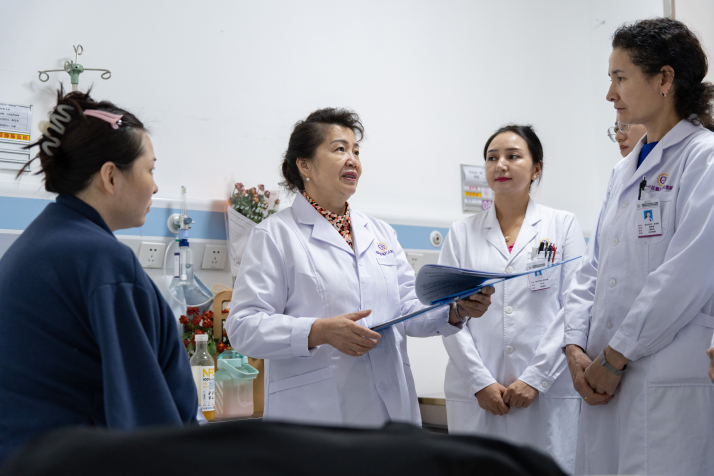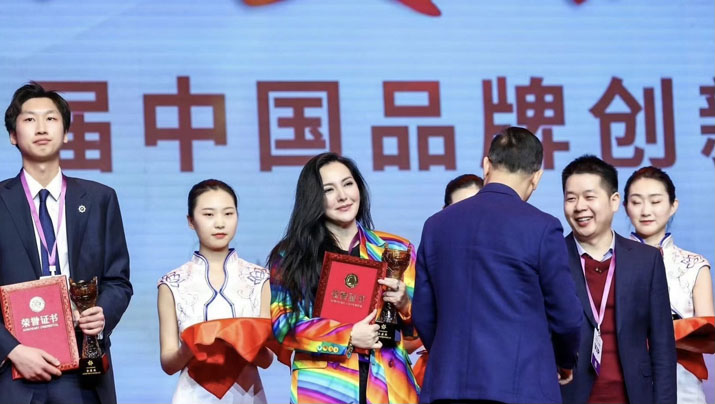| Xinjiang Today |
| A space of her own | |
|
|
 Aziguli Guji and her teammates pose for a group photo during a mountain trek (COURTESY PHOTO)
Thirty years ago, the Fourth World Conference on Women held in Beijing brought together more than 17,000 participants from across the globe in an unprecedented call for gender equality. The landmark Beijing Declaration and Platform for Action, adopted unanimously by 189 countries at the meeting, laid out a comprehensive agenda for the empowerment of women—one that, as the United Nations Women, a UN entity for gender equality and women's empowerment, describes, is still "the most progressive blueprint ever for advancing women's rights."
As the world observes the 30th anniversary of that milestone, China once again finds itself at the center of a global conversation on gender equality. On October 13-14, the Global Leaders' Meeting on Women convened in Beijing, where representatives gathered to discuss how to further advance women's development globally. Both meetings taking place in the same city was no coincidence. Over the past three decades, the vision set out in 1995 has been deeply woven in China's national development agenda, with women now playing an increasingly prominent role across all sectors of society. "In the new era, Chinese women, more confident than ever before, are taking part in the whole process of state and social governance. They are fighting on the front lines for rural revitalization and common prosperity as well as scientific innovation and digital transition. They are writing a splendid history of the cause of women in China," Chinese President Xi Jinping said in his address at the opening ceremony of the leaders' meeting. China's rural revitalization, a strategy introduced at the 19th Communist Party of China National Congress in 2017, promotes the economic prosperity and overall development of rural areas. It builds on the success of the nationwide poverty alleviation campaign that had eradicated absolute poverty as of late 2020. The year 2025 also marks another historic moment: The 70th anniversary of the founding of Xinjiang Uygur Autonomous Region, where economic growth, social stability and improvement in education, healthcare and social welfare have brought profound changes to women's lives. The dual anniversaries offer a moment for reflection on how far women in the region have come, and how deeply their stories are interwoven with the broader national pursuit of gender equality and women empowerment. Whether it is fulfilling personal dreams, changing the lives of others or breaking new ground in entrepreneurship and global engagement, women in Xinjiang are not only improving their own livelihoods but also redefining community roles and social expectations.  Aziguli Guji rejoices as she stands on top of a mountain (COURTESY PHOTO)
The ascent Across Xinjiang, a new generation of women is redefining what freedom means—sometimes in unexpected places. For Aziguli Guji, it is found atop mountains, in a realm traditionally dominated by men. Six years ago, she walked away from a seemingly fairytale marriage with two children in tow. Now, she runs the only company in Xinjiang that offers professional climbing instruction and rescue services. Aziguli's story began with a childhood fantasy. Growing up in Wensu County, Aksu Prefecture, she would often gaze at a distant snow-capped peak shimmering above the horizon, which she later discovered to be Mount Tomur, the highest summit in the Tianshan Mountains that run through Xinjiang. "I want to go there," she once told her father. "It's too far," he replied, more as a factual statement than disapproval. Her early years followed a predictable course. After finishing vocational school, she found work as an accountant at a small firm. A year later she married a colleague, then had two children and seemed to vanish into the invisible role of wife—until, at 35, she decided to get a divorce. That freedom, however, came at a heavy cost. Newly divorced and alone with two children to support, she found herself overwhelmed by anxiety, which took a severe toll on her health. The turning point came in the form of a rock-climbing session, which, as she later remembered, was terrifying and liberating in equal measure. "For the first time, I wasn't someone's wife or mother. I was just me," she recalled. Climbing soon became more than a pastime, as she threw herself into the sport, earning certifications, training alongside men who were often skeptical of her ability to keep pace and climbing ever-higher peaks. In 2024, she conquered Muztagh Ata, the second highest mountain on the Pamir Plateau in Xinjiang, standing at 7,546 meters. "There is still a long way to go," Aziguli said. She was not only referring to the physical peaks yet to be scaled but also to the many invisible barriers facing women mountaineers. One of these barriers she has noticed is the use of sanitary pads, which can be a huge source of discomfort during long expeditions. Therefore, she decided to create a pad specifically designed for outdoor sports. It took years of collaboration with a professional team before her own line of outdoor-use pads was ready for the market. Now, as the head of an outdoor sports club in Urumqi, Aziguli is developing a new route to Mount Tomur, the mountain she once admired from afar as a child. For her, life has come full circle: The girl once told that the mountain was "too far" now leads others toward it, one step at a time.  Mayinuer Niyazi (second left) discusses a patient's condition with medical staff during their ward rounds on March 4 (XINHUA)
Shine bright In Uygur, mayinuer means "bright moonlight"—a name that, by happy coincidence, encapsulates the life of Mayinuer Niyazi, chief gynaecologist at the People's Hospital of Xinjiang Uygur Autonomous Region. For 48 years, she has worked to cast light on one of the region's darkest public health challenges: cervical cancer, a cancer caused by persistent infection with human papillomavirus (HPV). Mayinuer's first close encounter with the disease came in 1976, shortly after graduating from Shanghai Medical College, when she was assigned to the gynaecology department of the hospital—then a small unit with only two wards and 16 beds, which were always occupied by sallow-faced women in the final stage of cervical cancer. According to the World Health Organization, cervical cancer is the fourth most common cancer among women globally. In Xinjiang, it has long been the most prevalent form of cancer among the female population. Back in the 1970s, local screenings were rare, and most cases in the region were not discovered until it was too late. Determined to change that, Mayinuer pursued her master's and doctoral studies overseas, where she saw how public health education, systematic screening and early intervention could dramatically reduce deaths from cervical cancer. On returning home, she put those lessons into practice by leading a team of specialists to carry out cervical cancer screenings in Hetian (Hotan), a prefecture in south Xinjiang. The data they gathered not only paved the way for the region's first cervical cancer database but also helped inform national health policies. In 2009, China launched a national program that offers free cervical and breast cancer screenings for rural women, with 14 counties in Xinjiang selected as part of the first pilot sites. Now, the region is seeking to expand screenings coverage to its urban population. In 2024, local authorities issued an action plan, setting the goal of screening at least 50 percent of women in the region for cervical cancer by 2025 and 70 percent by 2030. As a pioneer in the field, Mayinuer is working day and night to turn that goal into reality. To date, her team has screened more than 360,000 women; in south Xinjiang, new cases have dropped by 60 percent since 2006, when her screening campaign in Hetian began. The doctor named after the moon continues to shine across Xinjiang, brining light to the lives of countless women.  Palizhati Aini (third left) receives an award at the Seventh China Brand Innovation and Development Forum in Beijing in May 2021 (COURTESY PHOTO)
Beauty and beyond Many may remember Palizhati Aini from her early days on screen, when she starred in several TV drama series set in Xinjiang. Today, however, she is known by a very different title: founder and CEO of skincare brand Perideo. In 2009, at the height of her acting career, Palizhati traveled to Australia to further her studies—an experience that at once broadened her horizon and deepened her resolve to return to China and build a business of her own. In 2015, she returned to Xinjiang and founded Perideo, a brand that blends the region's rich botanical resources with Australian skincare technology. At a time when e-commerce was booming and Chinese women's spending power was on the rise, Chinese beauty brands were just beginning to take off. It was then that Palizhati identified a gap in the market—skincare tailored to Xinjiang's dry air and relentless sun. A decade on, the brand has not only gained popularity among local women but also expanded beyond Xinjiang to markets in Central Asia, Southeast Asia and the Middle East, proving that Xinjiang-made products can compete globally. Beyond business, she has devoted herself to philanthropy, particularly in advancing women's and children's rights. "I want women to realize that life is not just about taking care of a family," she said. "With my limited strength, I hope to inspire more women to find autonomy and, in doing so, help build a better society." In September, she brought this message to the world stage by delivering a keynote speech at a high-level meeting at the UN Office at Geneva, where she spoke of the countless women in Xinjiang whose achievements—whether in sport, medicine or the business world—show great courage, intelligence and grit. From the summit of Muztagh Ata to the barren edges of the Taklimakan Desert, and on to international conference halls, women across Xinjiang are carving out their own space in the story of contemporary China. As Palizhati put it in her UN address, "To be able to stand here is not just my own achievement; it is the story of every woman of Xinjiang shining in her own way." Comments to pengjiawei@cicgamericas.com |
|
||||||||||||||||||||||||||||
|